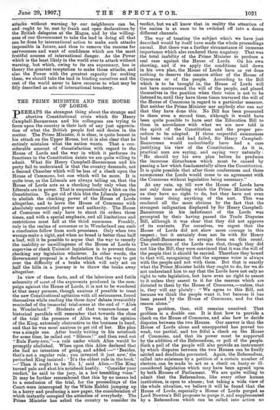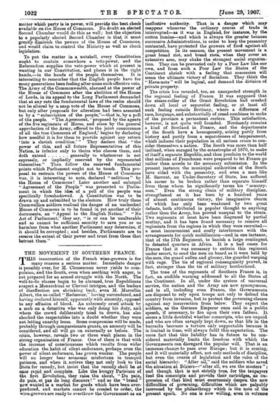THE PRIME MINISTER AND THE HOUSE OF LORDS.
PERHAPS the strangest thing about the strange and abortive Constitutional crisis which Sir Henry Campbell-Bannerman and . his colleagues are trying to force upon the country is their lack of any just apprecia- tion of what the British people feel and desire in the matter. The Prime Minister, it is clear, is quite honest in his attack on the Upper House. but it is also clear that he entirely mistakes what the nation wants. That a con- siderable amount of dissatisfaction with regard to the House of Lords and the way in which it performs its functions in the Constitution exists we are quite willing to admit. What Sir Henry Campbell-Bannerman and his party fail to understand is that the country demands, not a' Second Chamber which will be less of a check upon the House of Commons, but one which will be more. It is quite true, as the Liberals are always telling us, that the House of Lords acts as a checking body only when the Liberals are in power. That is unquestionably a blot on the Constitution. To get rid of this blot the Liberals propoth to abolish the checking power of the Houses of Lords altogether, and to leave the House of Commons with absolutely unrestricted power and authority.. The House of Commons will only have to shout its orders three times, and with a special emphasis, and all limitations and restrictions must fall at the third summons. Frankly, only in the realms of nonsense or in Wonderland can such a condusion follow from such premisses. Only when two wrongs make a right, and when no bread is better than half adoaf, will it be possible to argue that the way to remedy the inability or unwillingness of the House of Lords to supervise or check Unionist legislation is to prevent them checking' any legislation whatever. In other words, the Government proposal is a declaration that the way to get over the difficulty of a brake which will only act on half the hills in a journey is to throw the brake away
altogether. • .
In view of these facts, and of the laborious and futile solenmity of most of the arguments produced in the cam- paign against the House of Lords, it is not to be wondered at that many persons, though anxious if possible to treat the new Constitutional agitation with all seriousness, found themselves while reading the three days' debate irresistibly reminded of the immortal trial-scene at the end of "Alice in Wonderland." Students of that treasure-house of historical parallels will remember that -towards the close of the trial the presence of Alice was, in the opinion of the Ring, extremely obstructive to the business in hand, and that he was most anxious to get rid of her. His plan was a simple one. After busily writing in his notebook for some time, he called out " Silence ! ' and then read out "Rule Forty-two,"---a rule under which Alice would be promptly abolished. When upon this Alice declared that she had no intention of going, and added,':—" BesideS, that's not a regular rule ; you invented it just now,' the perturbed King insisted: 'It's the oldest rule in the book.' —' Then it ought to be No. 1,' said Alice—The King turned pale and shut hianotebook hastily. 'Consider your verdict,' he said to- the jury, in a low trembling voice." :It may be further remembered that this by no means led to a conclusion of the trial, for the 'proceedings of the Court were interrupted by the White Rabbit jumping up in a hurry and producing a new paper, the consideration of .which instantly occupied the attention of everybody. The Prime Minister has asked the country to consider its verdict, but we all know that in reality the attention of the nation is at once to be switched off into a dozen different channels.
The way Of treating the subject Which We have just described would by itself have made the whole proceedings unreal. But there was a further circumstance of immense importance which also rendered them nugatory. That was the total inability of the Prime Minister to produce a real case against the House of Lords. On his own showing, and .if we apply the conditions laid down in his . own plan, the House of Lords have as yet done nothing to deserve the censure either of the House of Commons or of the people. According to the Bill which is to be brought in, the House of Lords will not have contravened the will of the people, and placed themselves in the position when their voice is not to be listened to, until they have three times traversed the will of the House of Commons in regard to a particular measure. But neither the Prime Minister nor anybody else can say that they have done this. No Bill has been presented to them even a second time, although it would have been quite possible to have sent the Education Bill to them in accordance with what we are now told is the spirit of the Constitution and the proper pro- cedure to be adopted. If three respectful summonses had been tried and had failed, Sir Henry Campbell- Bannerman would undoubtedly have had a case justifying his view of the Constitution. As it is, practical men are saying, and saying very naturally : "He should try his own plan before he produces the immense disturbance . which must be caused by passing a law which fundamentally alters the Constitution. It is quite possible that after three conferences and three summonses the Lords would come to an agreement with the Commons without legislation being necessary" ,
At any rate, up till. now the House of Lords have not only done nothing which the Prime Minister tells us they have no right to do, but they have not even come near doing anything of the sort. This was rendered all the . more obvious by the fact that the strongest indignation displayed by Sir Henry Campbell. Bannermanin his indictment of the Lords was prompted by their having passed the Trade Disputes Bill, although it was clear that they did not approve of its contents. For ourselves, we regret that the House of Lords did not show more courage in this respect ;. but • it certainly does not lie with Sir Henry Campbell-Bannerman to arraign them on , this count. The contention of the Lords was that, though they did not like the Bill, they were convinced that it was the will of the.peoplethat it should be carried. Therefore they bowed to that will, recognising that the supreme voice is always with the people and not with them. But that is exactly what the Prime Minister holds they ought to do, for we do not understand him to say that the Lords have not only no right to veto legislation, but have even no right to assent to it unless they assent to it for the reasons which are dictated to thent by the House of Commons,—unless, that is, they will say plainly : "We agree to this Bill, not because we think the people want it, but because it has been passed by the House of Commons, and for that reason alone."
The problem, then, still remains unsolved. That problem is a double one. It is first how to provide a check on the House of Commons, and also how to decide disputes between the two Houses. Our answer is that the House of Lords alone and unsupported has proved too weak, too partial, and too fitful a check on the House of Commons, and that its power must be • supported by the addition of the Referendum, or poll of the people. Such a poll of the people will also provide an instrument by which disputes between the two Houses can be finally settled and deadlocks prevented. Again, the Referendum, called into existence by a petition of a certain number of electors, can be made to act as a cheek on hasty or ill- considered legislation which may have been agreed 'upon by both Houses of Parliament. We are quite willing to admit that the Referendum, like every other human institution, is open to abuses; but taking a wide view of the whole situation, we believe it will be found that the House of Lords, especially a House of Lords purged as Lord Newton's Bill proposes to purge it, and supplemented by a Referendum which can be called into action 'no Matter which party is in power, will provide the best cheek evaileble en the House of Commons. No doubt an elected Second Chamber would do this as well; but the objection to a popularly elected Second Chamber is that it must greatly diminish the powers of the House of Commons, and would claim to cootrol the tdieistry as well as check
To put the matter in a nutshell, every Constitution ought to contain somewhere a veto-power, and the Referendum supplies the veto-power which at present is wanting in our Constitution, and places it in the right hands,--in the hands of the people themselves. It is interesting to remember that the English people have for many generations been feeling after some such effective veto. The Army of the Commonwealth, alarmed at the power of the House of Commons after the abolition of the House of Lords, in its appeal to the Long Parliament demanded that at any rate the fundamental laws of the realm should not be altered by a snap vote of the House of Commons, but only after proposals for alteration had been assented to by a "subscription of the people,"—that is, by a poll of the people. "The Agreement, ' proposed by the agents of the five regiments of Horse, and since by the general approbation of the Army, offered to the joint concurrence of all the tree Commons of England,' begins by declaring how needful it is for them to provide against any return into a slavish condition.'" They declare that "the power of this, and all future Representatives of this Nation, is inferior only to theirs who choose them, and doth extend generally to whatsoever is not expressly, or implied's, reserved by the represented themselves." Then follow the reserved fundamental points which Parliament ought not to touch. This pro- posal to restrain the powers of the House of Commons was, it is interesting to note, declared " seditious " by the House of Commons! Later another and enlarged " Agreement of the People" was presented to Parlia- ment in which the idea of a poll of the people was specifically foreshadowed. A Constitution was to be drawn up and submitted to the electors. How truly these Cromwellian soldiers realised the danger of an unchecked House of Commons is to be found in yet another of their documents. an "Appeal to the English Nation." "No Aot of Parliament," they say, "is or can he unalterable and so cannot be sufficient security to save you or us harmless from what another Parliament may determine, if it ehould be corrupted ; and besides, Parliaments are to reoeive the extent of their power and trust from those that %trust them."

















































 Previous page
Previous page